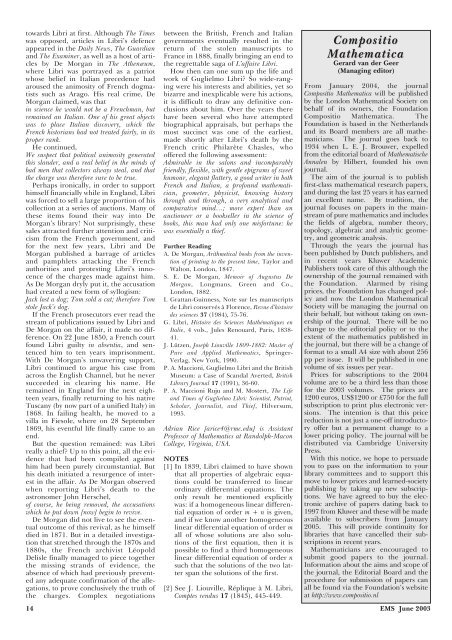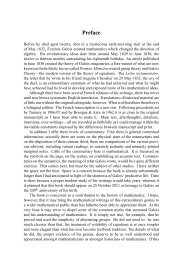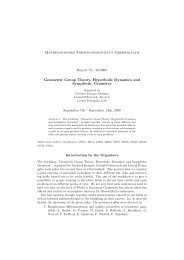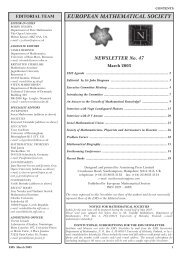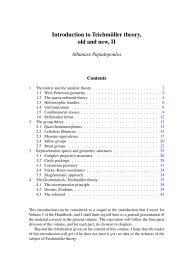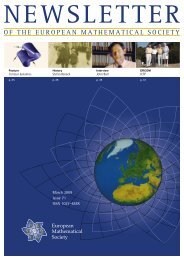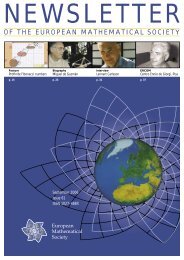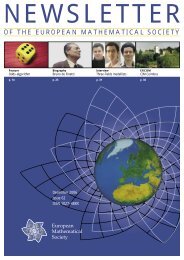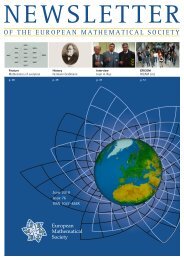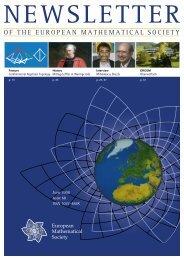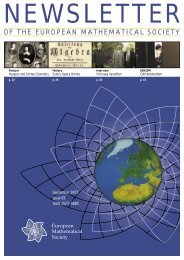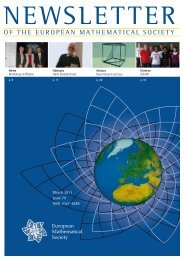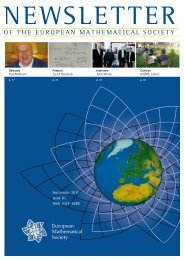June - European Mathematical Society Publishing House
June - European Mathematical Society Publishing House
June - European Mathematical Society Publishing House
Create successful ePaper yourself
Turn your PDF publications into a flip-book with our unique Google optimized e-Paper software.
towards Libri at first. Although The Times<br />
was opposed, articles in Libri’s defence<br />
appeared in the Daily News, The Guardian<br />
and The Examiner, as well as a host of articles<br />
by De Morgan in The Athenæum,<br />
where Libri was portrayed as a patriot<br />
whose belief in Italian precedence had<br />
aroused the animosity of French dogmatists<br />
such as Arago. His real crime, De<br />
Morgan claimed, was that<br />
in science he would not be a Frenchman, but<br />
remained an Italian. One of his great objects<br />
was to place Italian discovery, which the<br />
French historians had not treated fairly, in its<br />
proper rank.<br />
He continued,<br />
We suspect that political animosity generated<br />
this slander, and a real belief in the minds of<br />
bad men that collectors always steal, and that<br />
the charge was therefore sure to be true.<br />
Perhaps ironically, in order to support<br />
himself financially while in England, Libri<br />
was forced to sell a large proportion of his<br />
collection at a series of auctions. Many of<br />
these items found their way into De<br />
Morgan’s library! Not surprisingly, these<br />
sales attracted further attention and criticism<br />
from the French government, and<br />
for the next few years, Libri and De<br />
Morgan published a barrage of articles<br />
and pamphlets attacking the French<br />
authorities and protesting Libri’s innocence<br />
of the charges made against him.<br />
As De Morgan dryly put it, the accusation<br />
had created a new form of syllogism:<br />
Jack lost a dog; Tom sold a cat; therefore Tom<br />
stole Jack’s dog.<br />
If the French prosecutors ever read the<br />
stream of publications issued by Libri and<br />
De Morgan on the affair, it made no difference.<br />
On 22 <strong>June</strong> 1850, a French court<br />
found Libri guilty in absentia, and sentenced<br />
him to ten years imprisonment.<br />
With De Morgan’s unwavering support,<br />
Libri continued to argue his case from<br />
across the English Channel, but he never<br />
succeeded in clearing his name. He<br />
remained in England for the next eighteen<br />
years, finally returning to his native<br />
Tuscany (by now part of a unified Italy) in<br />
1868. In failing health, he moved to a<br />
villa in Fiesole, where on 28 September<br />
1869, his eventful life finally came to an<br />
end.<br />
But the question remained: was Libri<br />
really a thief? Up to this point, all the evidence<br />
that had been compiled against<br />
him had been purely circumstantial. But<br />
his death initiated a resurgence of interest<br />
in the affair. As De Morgan observed<br />
when reporting Libri’s death to the<br />
astronomer John Herschel,<br />
of course, he being removed, the accusations<br />
which he put down [now] begin to revive.<br />
De Morgan did not live to see the eventual<br />
outcome of this revival, as he himself<br />
died in 1871. But in a detailed investigation<br />
that stretched through the 1870s and<br />
1880s, the French archivist Léopold<br />
Delisle finally managed to piece together<br />
the missing strands of evidence, the<br />
absence of which had previously prevented<br />
any adequate confirmation of the allegations,<br />
to prove conclusively the truth of<br />
the charges. Complex negotiations<br />
14<br />
between the British, French and Italian<br />
governments eventually resulted in the<br />
return of the stolen manuscripts to<br />
France in 1888, finally bringing an end to<br />
the regrettable saga of L’affaire Libri.<br />
How then can one sum up the life and<br />
work of Guglielmo Libri? So wide-ranging<br />
were his interests and abilities, yet so<br />
bizarre and inexplicable were his actions,<br />
it is difficult to draw any definitive conclusions<br />
about him. Over the years there<br />
have been several who have attempted<br />
biographical appraisals, but perhaps the<br />
most succinct was one of the earliest,<br />
made shortly after Libri’s death by the<br />
French critic Philarète Chasles, who<br />
offered the following assessment:<br />
Admirable in the salons and incomparably<br />
friendly, flexible, with gentle epigrams of sweet<br />
humour, elegant flattery, a good writer in both<br />
French and Italian, a profound mathematician,<br />
geometer, physicist, knowing history<br />
through and through, a very analytical and<br />
comparative mind…; more expert than an<br />
auctioneer or a bookseller in the science of<br />
books, this man had only one misfortune: he<br />
was essentially a thief.<br />
Further Reading<br />
A. De Morgan, Arithmetical books from the invention<br />
of printing to the present time, Taylor and<br />
Walton, London, 1847.<br />
S. E. De Morgan, Memoir of Augustus De<br />
Morgan, Longmans, Green and Co.,<br />
London, 1882.<br />
I. Grattan-Guinness, Note sur les manuscripts<br />
de Libri conservés à Florence, Revue d’histoire<br />
des sciences 37 (1984), 75-76.<br />
G. Libri, Histoire des Sciences Mathématiques en<br />
Italie, 4 vols., Jules Renouard, Paris, 1838-<br />
41.<br />
J. Lützen, Joseph Liouville 1809-1882: Master of<br />
Pure and Applied Mathematics, Springer-<br />
Verlag, New York, 1990.<br />
P. A. Maccioni, Guglielmo Libri and the British<br />
Museum: a Case of Scandal Averted, British<br />
Library Journal 17 (1991), 36-60.<br />
P. A. Maccioni Ruju and M. Mostert, The Life<br />
and Times of Guglielmo Libri: Scientist, Patriot,<br />
Scholar, Journalist, and Thief, Hilversum,<br />
1995.<br />
Adrian Rice [arice4@rmc.edu] is Assistant<br />
Professor of Mathematics at Randolph-Macon<br />
College, Virginia, USA.<br />
NOTES<br />
[1] In 1839, Libri claimed to have shown<br />
that all properties of algebraic equations<br />
could be transferred to linear<br />
ordinary differential equations. The<br />
only result he mentioned explicitly<br />
was: if a homogeneous linear differential<br />
equation of order m +nis given,<br />
and if we know another homogeneous<br />
linear differential equation of order m<br />
all of whose solutions are also solutions<br />
of the first equation, then it is<br />
possible to find a third homogeneous<br />
linear differential equation of order n<br />
such that the solutions of the two latter<br />
span the solutions of the first.<br />
[2] See J. Liouville, Réplique à M. Libri,<br />
Comptes rendus 17 (1843), 445-449.<br />
Compositio<br />
Mathematica<br />
Gerard van der Geer<br />
(Managing editor)<br />
From January 2004, the journal<br />
Compositio Mathematica will be published<br />
by the London <strong>Mathematical</strong> <strong>Society</strong> on<br />
behalf of its owners, the Foundation<br />
Compositio Mathematica. The<br />
Foundation is based in the Netherlands<br />
and its Board members are all mathematicians.<br />
The journal goes back to<br />
1934 when L. E. J. Brouwer, expelled<br />
from the editorial board of Mathematische<br />
Annalen by Hilbert, founded his own<br />
journal.<br />
The aim of the journal is to publish<br />
first-class mathematical research papers,<br />
and during the last 25 years it has earned<br />
an excellent name. By tradition, the<br />
journal focuses on papers in the mainstream<br />
of pure mathematics and includes<br />
the fields of algebra, number theory,<br />
topology, algebraic and analytic geometry,<br />
and geometric analysis.<br />
Through the years the journal has<br />
been published by Dutch publishers, and<br />
in recent years Kluwer Academic<br />
Publishers took care of this although the<br />
ownership of the journal remained with<br />
the Foundation. Alarmed by rising<br />
prices, the Foundation has changed policy<br />
and now the London <strong>Mathematical</strong><br />
<strong>Society</strong> will be managing the journal on<br />
their behalf, but without taking on ownership<br />
of the journal. There will be no<br />
change to the editorial policy or to the<br />
extent of the mathematics published in<br />
the journal, but there will be a change of<br />
format to a small A4 size with about 256<br />
pp per issue. It will be published in one<br />
volume of six issues per year.<br />
Prices for subscriptions to the 2004<br />
volume are to be a third less than those<br />
for the 2003 volumes. The prices are<br />
1200 euros, US$1200 or £750 for the full<br />
subscription to print plus electronic versions.<br />
The intention is that this price<br />
reduction is not just a one-off introductory<br />
offer but a permanent change to a<br />
lower pricing policy. The journal will be<br />
distributed via Cambridge University<br />
Press.<br />
With this notice, we hope to persuade<br />
you to pass on the information to your<br />
library committees and to support this<br />
move to lower prices and learned-society<br />
publishing by taking up new subscriptions.<br />
We have agreed to buy the electronic<br />
archive of papers dating back to<br />
1997 from Kluwer and these will be made<br />
available to subscribers from January<br />
2005. This will provide continuity for<br />
libraries that have cancelled their subscriptions<br />
in recent years.<br />
Mathematicians are encouraged to<br />
submit good papers to the journal.<br />
Information about the aims and scope of<br />
the journal, the Editorial Board and the<br />
procedure for submission of papers can<br />
all be found via the Foundation’s website<br />
at http://www.compositio.nl<br />
EMS <strong>June</strong> 2003


